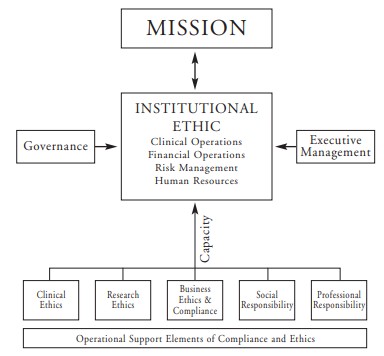"A place for everything, everything in its place."
— Benjamin Franklin1
The spring, 2007 issue of Health Care Ethics USA contained an article by David Belde, Ph.D. entitled "Toward a 'Total Organizational Ethic' in Health Care Ethics." That article had an impact beyond Catholic health care. My organization — the Medical College of Georgia Health System — is neither Catholic nor faith-based. Yet we are rethinking our overall ethics strategy and moving into a "total organizational ethic." Toward this end, we are exploring an "alternative" ethics strategy that attempts to permeate the entire health care organization by attending to and responding to both clinical and non-clinical aspects of the organization's life and by better aligning ethics and compliance.
Why are we doing this? Quite simply, although we are not a Catholic organization, we do have a mission and values that are important to the success of our organization and community. We believe our values illustrate our commitment to integrity and ethics beyond the minimum standards set by laws and regulations. We also believe in cultivating an organizational culture built upon virtues and in ensuring that our values are central in organizational decision making.
Instead of taking a compartmentalized approach to health care ethics and compliance we are aligning them.2 The integrated model we are considering not only takes into account the organization's legal duties and the moral rights of others, but aligns ethical considerations in a systematic manner and recognizes that a single compliance/ethics incident can be reflective of a larger organizational ethic.
We are confident that our model clarifies for employees what conduct is appropriate to the mission and values of the organization, and what it not. At the same time, it acknowledges that emphasizing mission, ethics, and values without stressing the necessity and complexity of rules and laws can leave employees in a vulnerable position. As a result, our integrated model answers the question "Is it legal?", but also
brings to bear identification of all stakeholders, the values and concerns at issue, and consideration of alternatives. Moreover, our approach allows us not only to defend our choices, but also helps us understand why we have decided against other alternatives. Finally, by practicing such discernment we hope to clearly identity our motivations.
Breaking down old structures and creating a new ethical approach that responds to the entire organization has been an exciting challenge. We are grateful to Dr. Belde for his ideas and his guidance in this enterprise.3

Michael A. Spake, MHA/JD
Director, Compliance & Privacy
MCG Health, Inc.
Augusta, GA
NOTES
- Poor Richard's Almanac.
- Many hospitals have inadvertently created an "ethics" shortfall by creating a division between compliance and ethics. The narrow concentration of ethics and compliance has lead to the correlation of compliance with business transactions (i.e. Business Ethics) and ethics with clinical care (case consultation). Values analysis and ethical discernment should be carefully distinguished, though, from compliance analysis. Compliance requirements do not always reflect society's moral standards and values, even when the law is directly concerned with ethical or moral problems. The mere fact that something is legal does not make it morally acceptable. At the same time emphasizing ethics without stressing the necessity of rules and laws can leave employees in a vulnerable position.
- As the former Director of Corporate Responsibility at Bon Secours Richmond Health System I had the pleasure of working with Dr. Belde. During our 9-month overlap we shared many thoughts and ideas aligning ethics and compliance.
Copyright © 2009 CHA. Permission granted to CHA-member organizations and Saint Louis University to copy and distribute for educational purposes. For reprint permission, contact Betty Crosby or call (314) 253-3490.